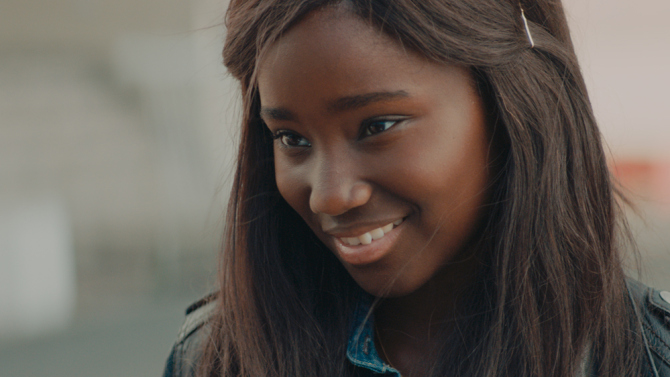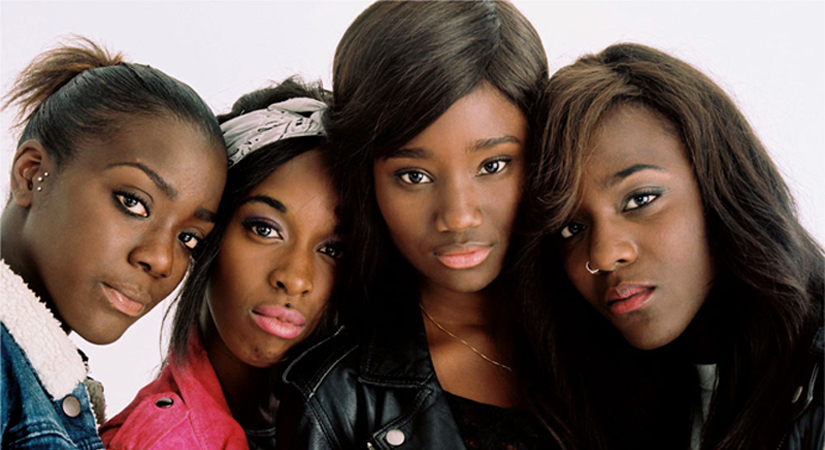A few weeks ago here I shared the first of my lists for the most anticipated African diaspora films for 2015. Featured was the French coming-of-age narrative film Girlhood, an already much-talked about examination of a young Black girl living on the outskirts of Paris and her quest for a better life away from her abusive home situation.
In that previous write-up, my fear was that Girlhood would be a misguided outsider’s view, with the writer/director being a White woman, of the problems a young Black girl faces in a city that is continuously unsupportive of Black lives – especially those of immigrant cultures like lead character Mirieme appears to be, and now after seeing the film is, definitely a part of. While the political realities of immigrant life (whether Mirieme is first generation French, or hails from a Francophone African country like Mali or Senegal) are not directly addressed, the socioeconomic state is, and the working-class relative poverty her friends and family live in provides one of the underlying elements of their conditions and outrage. But ultimately the film is much more than that. And I am glad to share that Girlhood is, arguably, non-hegemonic in its approach to its Black characters and is in fact a very insightful look into teenage life, though it does have its issues.
Girlhood begins with Mirieme, played with sensitivity and charm by first-time actress Karidja Touré, being physically abused by older brother Djibril (Cyril Mendy) who feels that she needs to take care of their home better since their mother works long hours as a cleaning lady. He is also trying to toughen her up a bit in attempts to make her less immature. The abuse angle here is a bit farfetched to move the story into the direction of Mirieme seeking solace in taking up with three rowdy girls, but her actual entry into the ‘gang’ is a lot more realistic for a 14-year old girl’s motivations, saving the earlier plot hole.
Writer/director Céline Sciamma takes Mirieme on a well-paced journey with the girls, making her tougher, more devious, self-reliant, outgoing (actually approaching a boy she likes) and a high-school dropout – so some good, and a lot of bad. She even takes the nickname Vic. The ‘gang,’ and I phrase it so because they are no so much that as your average annoyingly loud bad-girls you see in the malls or on the trains seeking their own identities, are led by Lady, in an awesome performance of roughness and sly intelligence and movements by actress Assa Sylla. The loudmouth storyteller/gossip queen Adiatou (Lyndsay Karamoh) and the somewhat quiet, yet tough as she as sweet Fily (Marietou Touré) round out the cast of girls battling against society in the only ways they know possible. While these characters are all archetypes, with personalities typical of a cinematic (or even actual) set of friends, what is atypical are the convincing, and quite frankly intoxicating, performances by these young ladies.

While dynamics in the friendships grow stronger, Girlhood then takes an abrupt and surprising turn that forces Mirieme to take on yet another personality and look. Sciamma makes this work though, and Mirieme eventually makes the foray into becoming a young woman able to make her own decisions. There’s nothing stereotypical in this turn. It sits with you after watching.
In some ways, Girlhood is reminiscent of Dee Rees’ 2011 film Pariah, with an unflinching approach to the personal and family life of a modern Black girl. Girlhood is also shot beautifully. It’s not cinematographer Crystel Fournier’s and Sciamma’s color palette that stands out like how Bradford Young’s did in Pariah, but their choices of angles and film saturation. Quite often, especially when she is trying to figure out things, Mirieme has her back turned to the screen and to whom she is talking to – basically she is hiding in plain sight, participating in the everydayness of the world but removed from it as well. But even more pronounced, and according to Sciamma’s director’s notes intentionally, is the undeniable physical Blackness of the characters. Mirieme, Lady, all the girls are phenotypically Black in their appearance. And while the director cast the film according to their charisma, inventiveness, and humor, she admits that:
“One of the central ideas of my filmmaking and this project is to show faces
and bodies that we never see on screen. Generally when these types of
personalities are represented on screen, it’s not to focus on the character
but more so a kind of grand gesture showcasing them as part of a certain
diversity. This movie isn’t about diversity, but exclusiveness: The male and
female actors are exclusively colored.”
This scene from the film points to Sciamma’s visual intentions. Now this creative choice, and even the frank sexuality of the girls – who everyday are wrestling with their own sexuality and attractiveness to men and each other in society – can be seen as exploitative. Maybe it is, but I don’t take that away from the film. Girlhood just works on so many levels, much like its opposite film from last year, the American film Boyhood, that it is difficult to walk away with a exclusive grasp on it. This complexity alone makes it worth the watch.
See Girlhood starting January 30 in New York City. Check your listings for theaters and showtimes.
Girlhood (Bande de Fille)
With Karidja Touré, Assa Sylla, Lindsay Karamoh, Marietou Touré, Idrissa Diabate, Simina Soumare, Cyril Mendy, Djibril Gueye
Director/Writer: Céline Sciamma
Country of Origin: France
Running Time: 112 minutes
Genre: Drama
In French with English Subtitles


